Alumna returns 37 years later to bestow gift for future nurses
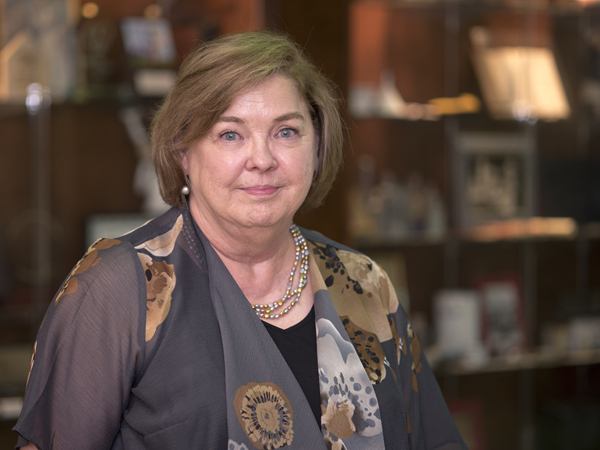
Published in News Stories on May 09, 2016
Before last Thursday, JoAnn McCullar Vandergriff hadn't stepped foot inside the University of Mississippi School of Nursing since she graduated in 1979, but her heart was still within those walls.
When she and her husband, Bill, were planning their retirement, the couple decided to set up a charitable remainder trust, a planned gift that will endow the JoAnn McCullar Vandergriff Scholarship and provide substantial support to the School of Nursing. The couple also made a donation to allow a scholarship to be awarded now to assist two deserving accelerated nursing students.
As the first in her family to graduate from high school and earn a college degree, Vandergriff understands the importance of education to accomplishing one's goals.
“My husband and I worked to get an education in order to get ahead,” said Vandergriff. “That education gave us the means to give back to others so that they can get ahead too.”
Born in Water Valley before the small town had a hospital, Vandergriff attended Horn Lake High School in Desoto County.
She found her passion for nursing during her senior year when her high school hosted its first ever career day.
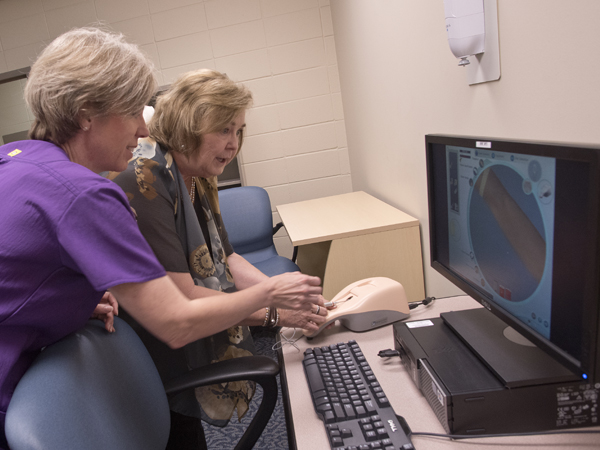
Robyn MacSorley, assistant professor in the School of Nursing, assists Vandergriff as she tries out the Virtual I.V. used to train students in the SON.
“My whole goal was to be a secretary,” said Vandergriff. “But when a nurse from Methodist Hospital in Memphis talked to our class about what she did as a nurse, I decided that was what I wanted to do.”
Vandergriff completed a year-long LPN program, but after receiving her diploma and passing the nursing exams, Bill encouraged her to continue her education.
“Bill said, 'Keep going. This is it. You are good at it, and you like it,'” said Vandergriff. “He has always been very supportive of me.”
She decided to pursue a BSN degree from the UM School of Nursing. After graduating with her BSN, Vandergriff earned a master's degree in education from Memphis State, now known as University of Memphis.
“I told [Bill], 'When I get done with this degree, we are going to do something very different,'” said Vandergriff. “I saw a blind ad in the newspaper looking for a nursing director. It had a post office box for you to send your resume to apply. Today, no one would ever do something like answer a blind ad. I interviewed, and I got the job.”
The job opportunity was to live and work in the Yemen Arab Republic at Al-Salem Hospital located near the southern Saudi Arabian border. Vandergriff was the nursing director for a 100-person staff, and her husband became the assistant administrator for all other departments in the hospital.
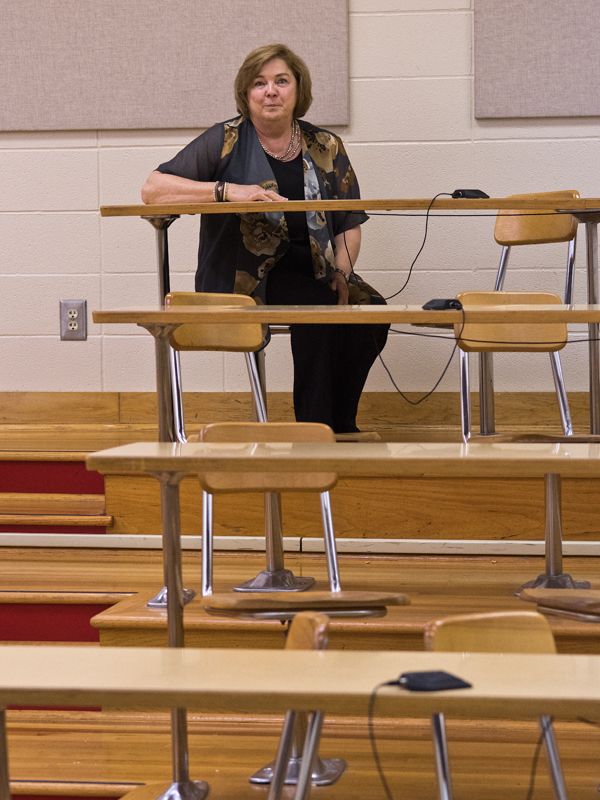
Vandergriff took time out on the tour of the SON to find her old seat in classroom A035, the only classroom in the SON still outfitted with original desks.
“We both quit good jobs, and our family was like 'what are you doing?'” said Vandergriff. “It was a good experience. I found out I had a good education, a good foundation.”
One of their most memorable cases while in Yemen also taught the couple an important management principle. A young boy around 5 years old arrived at the emergency department with an “extensive scalp wound.”
“When asked what happened, he replied, 'a donkey bit my head,'” said Vandergriff. “When we asked why the donkey bit him, the boy said, 'because I was poking a stick up his nose.' We laughed but we also reflected on his answer. Don't poke at people - it hurts and you don't know how serious the bite will be.”
The decision for Vandergriff to return to school and pursue her advanced nursing practice degree was patient-focused.
“After a couple of years of pushing papers and not making people happy, I decided to go back to school to get the patient-centered focus back,” said Vandergriff. “It all led back to the patients.”
At that time, Ole Miss did not offer a nurse practitioner program, so Vandergriff attended Mississippi University for Women to earn her advanced nursing degree. The couple then opened a small clinic in rural Crenshaw to meet the health-care needs of rural Mississippians.
The Vandergriffs left Mississippi in 1992 when changes to state regulations pertaining to nurse practitioners caused the Crenshaw clinic to be closed. They moved west where Vandergriff provided innovative health-care services to the Navajo Nation in Utah from a van, the state's first mobile rural health clinic.
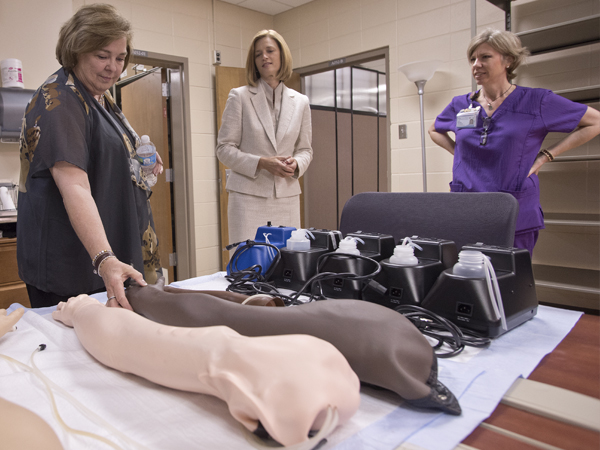
Dr. Kim Hoover, dean of the School of Nursing, center, spent the morning touring Vandergriff, left, through the school, including a stop in the simulation lab where MacSorely, right, demonstrated advances in simulation equipment such as the artificial arms students use to practice starting I.V. fluids.
In Utah, Vandergriff was also introduced to what would become a 20-year career in emergency medicine. Her first emergency case involved stabilizing a rodeo bull rider with a broken femur.
“In the southwest, the towns are many miles apart. Some locations are remote, and health care is sparse,” said Vandergriff. “You quickly learn how much can be accomplished with a phone call.”
What she enjoyed most about the emergency department was the variety of cases on a daily basis.
“I loved emergency medicine because every day was a new day,” said Vandergriff. “I never knew what a day would present. It definitely kept me on my toes.”
Vandergriff left emergency medicine not long ago for a clinic environment. She now works at the Federal Law Enforcement Training Center in New Mexico, providing health care to border patrol students. She also spends two days a week at the Lee County Urgent Care Clinic in Hobbs, New Mexico.
The Vandergriffs hope their gift will help students in the School of Nursing achieve their career goals and improve health care in Mississippi.
The year's scholarship, which will provide tuition assistance for students in the Accelerated BSN program, is currently the only scholarship designated solely for accelerated nursing students. The program is unique in that it provides a fast-track approach for individuals with a bachelor's degree in another field who want to pursue a new career path in nursing. Many are adults with families who are leaving full-time jobs to return to school and may have a greater need for financial support.
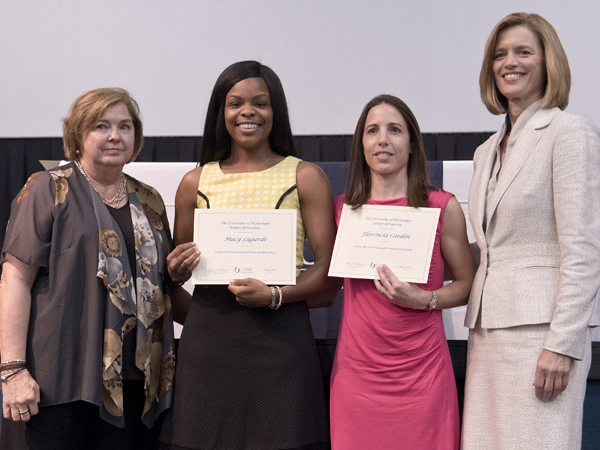
From the left are Vandergriff and scholarship winners Macy Lagarde and Florencia Carden with Hoover.
“The Vandergriff's gift fills a critical need for financial assistance for our accelerated BSN students,” said Dr. Kim Hoover, dean of the school. “The program is an intense immersion into nursing, and most are not able to work once classes begin. These scholarships help ensure their success.""
The first recipients of the scholarship are Florencia Carden and Macy Lagarde. Both began the accelerated nursing program in January and are starting their second of three semesters this summer.
Lagarde has a bachelor's degree in psychology with a minor in biology. She said that she has learned a lot in the fast-paced program.
“The first semester has been amazing. I think a nursing degree is going to give me more career options than my current degree,” said Lagarde. “It will open a lot more doors.”
Carden, a wife and mother of two young children, has been working as an insurance adjustor, but she said she has always felt strongly about wanting to help people.
“I'm from Argentina and bilingual,” said Carden. “I volunteered in the past as a translator in hospitals and clinics, and I thought I could really be of help as a bilingual nurse.”


